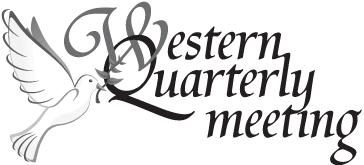Published in 1941, before the US even entered WW II, the introduction to Dr. William Comfort’s book, Just Among Friends, gives a glimpse to the modern reader of how Friends were already perceived at the time — actively engaged in living their testimonies in a notable and transformative way.
There is still much injustice and unrest in the world, and many Friends are working to rectify wrongs through actions large and small. I read these words as a challenge to myself to find the spiritual discipline to answer a higher calling, and live my life more fully in the Light.
Introduction, by Henry Seidel Canby
“The book which follows could not be more timely. It is an account of the way of life of a people who determined three hundred years ago to make the world their friends, and who, through persecution, neglect, and disintegration, have never failed in either work or testimony to uphold their faith. The Friends, those people called Quakers, once hoped to conquer the world by their courage, benevolence, and love. They have not — as is only too evident — done that. Indeed, they number now only the tiniest minority among the religious sects. And yet no one can doubt Dr. Comfort’s statement that they have become a holding company for great ideas — tolerance, peace, Christian kindness to the enemy, economic and social justice, and active recognition of the brotherhood of man — which all men and women of good will share but have failed to put into communal practice. Quietly, and without slogans or campaigns, the Quakers have become the most trusted agents of humanity in an inhuman age. They carry relief where no others are permitted to go. They win the confidence of violent and dictatorial men because it is evident that they have freed their hearts of both violence and hatred. They have made a successful adjustment between what they believe to be the will of God and what they regard as the proper will of man. They are not afraid to have confidence in a disciplined human nature. Dr. Comfort’s book, as the reader will discover, is neither a history of the Friends nor an account of their achievements, though it touches upon both. It is a simple and persuasive explanation of their way of life, and an account of how it came about, how it is perpetuated, and its results. It will be widely read by Friends, it should be read by the thousands to whom Quaker is only a name associated with peace and good works. But I think it will be of especial interest to those other thousands — far more numerous than the present society — who have, like myself, shared by inheritance or youthful experience the Quaker tradition and are aware of its power and its comfort. No doctrinal peculiarity is responsible for the warmth and vigor of this tradition. Quakerism is merely Christianity writ plain, reduced to its primitive mysticism, and made practical by a discipline applied to the way of life of a Friend. Its core is neither the Bible nor the theology of a church, but rather the Inner Light, which is that intuition of the presence of God which makes it possible for the individual to discover what is evil for him and, by avoiding it, bring his being into a harmony. Thus Quakerism is the most individualistic of creeds, yet none has been so successful in communal action, and none has so consistently practised (sic) the precept to love thy neighbor as thyself. If the Inner Light is the hear of Quakerism, is discipline is its bone and muscle. Restraint, moderation, deliberation, a sure response to conscience gained in silence and inner search, have their fruits in business, in racial and national relations, in family life, and in a content with experience no matter how difficult. Dr. Comfort has been a college president as well as a Quaker and does not make the mistake of the earliest Friends who believed that all humanity could conform to such a pattern. He notes that few leaders in politics, few great poets, great artists, philosophers, and makers of new knowledge have been Quakers. The emphasis has been too much on character and spiritual peace, too little upon the creative intellect and the creative passion for such leadership. There is a neuroticism (sic) in genius which does not fit into the Quaker way. And yet his book will make clear how far the old charges of quietism and obscurantism, once brought against the Quakers, are out of date. Their attitude toward war, for which they are most widely known, was once passive but has become active. War is now a call to action for the Quakers, who are engaged on every front in the dangerous task of carrying love and care of their fellowmen into the midst of destruction. They not only know, as does every sensible man, that there is no long-term hope for the world in defensive and offensive armament and military prowess, but they are already engaged in practising the good will which alone can insure the survival of a mechanized civilization. It is quite clear after reading Dr. Comfort why one has to earn the right to become a Quaker, and by harder proofs that wearing the plain clothes which once (but no more) were the badge of the Society. It would seem that this “peculiar people,” as they used to be called, represents in the evolution of society a mutation toward a new phase of human nature of immense importance in a world which, as we see today, is always slipping back toward cruelty, greed, and the sick need of satisfying injured vanity. Their 110,000 members here, and 30,000 abroad, do really represent a holding company for a workable faith in a future that at the moment seems so dark. “

Comments are closed.